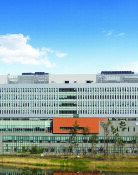The Panmunjom meeting was a ‘pretty good’ political show
The Panmunjom meeting was a ‘pretty good’ political show
Posted July. 06, 2019 07:36,
Updated July. 06, 2019 07:36
There is no better expression than “political show” to describe the third summit between U.S. President Donald Trump and North Korean leader Kim Jong Un that took place on Sunday. The expression “political show” is used negatively in general. The political show that took place at the inter-Korean border village of Panmunjom this time, however, has contributed to managing the issues on the Korean Peninsula. This is why it can be viewed positively even though it was a political show.
Words such as symbolism, atmosphere, gestures, and spontaneousness have been used to describe the Panmunjom meeting, but there was no detailed explanation about it. This probably is to highlight that the meeting was scheduled unexpectedly. The leaders of the three countries concerned needed diplomatic achievements of some sort due to their domestic political situation. President Trump had to prove his diplomatic capabilities with the 2020 presidential election approaching.
For South Korean President Moon Jae-in, he needed to play the North Korean card again with the domestic economy faltering and the general elections approaching. Interestingly, the North Korean leader appeared to have had problems within his country, according to multiple sources. A rumor has it that North Korean elites have been dissatisfied with the Chairman Kim’s diplomacy since the breakdown of the Hanoi summit, saying that Kim was fooled by the U.S. This is why Kim Jong Un needed to display his diplomatic capability.
But it is not only a political gain a leader of a country pursues. The three leaders definitely have a willingness to manage and address North Korean nuclear issues through diplomacy. To be sure, they all have different ideas of compromise. Kim might agree to nuclear disarmament or a nuclear freeze but has no intention whatsoever to give up his nuclear program. He wants to come to agreement but at the same time aims to buy time by having negotiations. President Trump has not let go of his seemingly impossible dream to denuclearize North Korea but seems to be developing more and more interest in nuclear disarmament of North Korea, a first step toward denuclearization. Meanwhile, Moon is concerned that the situation on the Korean Peninsula would get worse like it did in 2017 if the current stalemate continues but is likely to accept a compromise of some sort since he does not want inter-Korea relations hampered by the current stalemate. In short, all three leaders are willing to continue diplomatic negotiations.
But it is hard to expect much from the upcoming working-level meetings between the Washington and Pyongyang. North Korea has no intention of giving up its nuclear program. It would not abandon its nuclear programs in exchange for any benefits, such as security guarantees, generous compensation, or sanctions relief. The three countries would continue to talk about denuclearization due to diplomatic reasons but now is the time to face the reality. The purpose of denuclearization diplomacy is not “resolving” the North Korean nuclear issue but “managing” it. The real purpose of it is to “manage” the ever-growing North Korean nuclear crisis.





![[단독]年수출 처음 일본 제쳤다…韓 1041조원 vs 日 1021조원](https://dimg.donga.com/c/138/175/90/1/wps/NEWS/IMAGE/2026/01/22/133214781.1.jpg)

